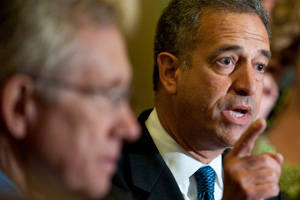Atmospheric scientist Judith Curry—much-discussed on the blogs these days thanks to a recent Scientific American story on her skirmishes with fellow climate scientists—has offered some interesting thoughts in response to my climate hawk posts. I look forward to reading the rest of her series on decision-making in the face of uncertainty, which is certainly at the heart of the climate challenge.
In the meantime, it’s worth saying something about this part of her post:
One of the things I really like about David Roberts’ scheme is that climate scientists are removed from the political debate. Scientists and science inform the debate, but the political battles stay in the realm of politics.
While I support the general idea of the climate hawks and doves, I don’t support this idea put forward by John Rennie and Keith Kloor that somehow I could make this all work by declaring my position as a climate hawk. I think this is exactly what not to do: the beauty of this idea is that it separates the climate science from the politics. This only works if the scientists stay out of the politics.
Climate scientists have no particular expertise on politics, economics or social ethics. A scientist’s personal sense of values and morality has no more legitimacy in this debate than any other individual’s personal sense. There’s an additional reason for climate scientists to stay out of the public debate on this topic: they are biased because of their personal research interests and results, with professional egos and other factors likely weighing into their policy preferences.
Staying out of politics does not preclude engagement in the policy process. Climate scientists have a key role to play in developing future scenarios, characterizing uncertainties, and analyzing policy options.
People ask me where I stand and what my preferred policy options are. I am not being coy when I say that I want clean green energy, economic development and “world peace.” And that I don’t have any particular wisdom or ideas on what the actual solution might be.
There’s a lot going on in this passage, so I want to pick a few threads apart.
First, as a general matter, I agree with Curry’s sentiment. There’s no reason to think a physical scientist’s moral, ethical, or economic opinions should carry particular weight in policy deliberations. On those matters, they are but citizens among other citizens. Curry’s blunt candor on the matter is refreshing, an improvement on James Hansen telling us that science dictates one carbon-pricing policy over another.
However, I don’t think scientists can be “removed from the political debate” that easily, certainly not by any decree of mine! It’s very difficult in practice to separate out Things Scientists Do (“future scenarios, characterizing uncertainties, and analyzing policy options”) from Things Scientists Don’t Do (“politics, economics or social ethics”), even in the best of circumstances. However, even if scientists entirely confine their involvement to dispassionate, unbiased fact and analysis, climate science will still be politicized.
To understand why requires a clear view of the current political dynamic in the US, which is what’s often lacking in pieces like Curry’s.
One problem is that the people pleading for a depoliticization of science tend to be characterological centrists (CCs). A CC is, by temperament, attached to his/her self-image as an independent thinker, thoughtful and nuanced, seeing both sides of the argument, not part of any team or “side,” disgusted by unthinking partisans. CCs are strongly inclined to see political problems in terms of “extremes on both sides” polarizing and dumbing down the debate. The sweet light of reason and virtue, according to CCs, lies between the sides, or rather in new, “post-partisan” options that transcend the tired conventional debates. You often hear this kind of thing from Revkin, Pielke Jr., the Breakthrough boys, and that crowd, though of course it’s but a species of a much more common genus of political commentators. In the Beltway it’s known as High Broderism, after the dean of D.C. pundits, David Broder.
There’s nothing wrong with such a temperament, of course. It’s well-suited to the careful work of science or scholarship, where getting from thesis and antithesis to synthesis is in fact a deliberative intellectual process. Politics, however, isn’t like that, “marketplace of ideas” fantasies aside. It’s not about determining who’s right, or who’s cleverest; it’s about determining the distribution of society’s resources, privileges, and responsibilities. It’s about power.
The reality of contemporary American energy politics is awkward for CCs. The fact is that the Republican Party has become, for all intents and purposes, the political arm of the fossil-fuel status quo. The entrenched energy powers-that-be have marshaled the right’s current vulgar anti-intellectualism in support of their continued privilege; to put it more bluntly, they have been and still are paying people on the right to lie about science and dupe the conservative base.
I’m not talking about climate sensitivities or hurricane frequency or sea-level projections or other areas of active scientific disputation. I’m talking about whether human beings are driving changes in the climate. That question is simply not in serious dispute in the relevant scientific disciplines. It has been confirmed by multiple lines of evidence, empirical and model-based, over many years. Curry and virtually every other credible climate scientist would no doubt agree. Yet Republicans have now made rejection of that root scientific consensus a litmus test, in keeping with their decades-long assault on America’s institutions. Virtually every Republican candidate for Congress has denied the most rudimentary facts about climate change.
Yes, Democrats mangle climate science sometimes too. Activists can exaggerate the degree of certainty behind model projections. Scientists can be unduly dismissive of critics. Nobody is blameless. But there is simply nothing on the left (or in the center, or in professional science) remotely equivalent to the anti-intellectualism that reaches to the very top of the Republican Party.
Conservatives are politicizing climate science. Curry is uncomfortable saying that; it sounds like “getting involved in politics.” Most CCs are averse to saying it for fear of appearing partisan (rather than, uh, “post-partisan”). But the fact remains: Even if climate scientists confine their comments purely to what’s known with a high degree of probability, with all the uncertainties baked right in, staying scrupulously clear of policy or ethical judgments, they will still find themselves aligned against the conservative movement and they will be attacked. Republicans slander peer review, science funding, scientific institutions, and scientists themselves. “Both sides” don’t do that. Just the right side.
(Of course I’m aware that there are conseratives and even some climate scientists with good-faith doubts about certain aspects of the science. But we’re talking about politics—not conservative intellectuals, the conservative movement.)
Curry may be able to remain scrupulously apolitical, if that’s her inclination. But climate science in general cannot escape politics. Not because scientists—or the advocates and politicians who take it seriously—did anything to bring it on themselves. It’s just that an alliance of energy incumbents and far-right ideologues has chosen to lie relentlessly about it. In the milieu of current climate and energy politics, speaking the truth is a political act. The only way to escape politics is to lapse into silence.
This post was produced by Grist as part of the Climate Desk collaboration.














